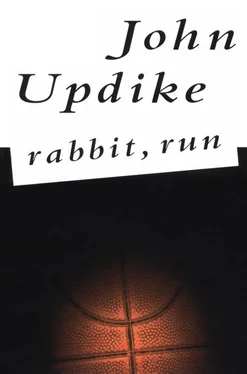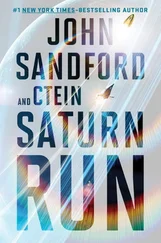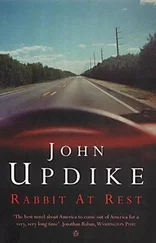As he walks along Potter Avenue the wires at their silent height strike into and through the crowns of the breathing maples. At the next corner, where the water from the ice plant used to come down, sob into a drain, and reappear on the other side of the street, Rabbit crosses over and walks beside the gutter where the water used to run, coating the shallow side of its course with ribbons of green slime waving and waiting to slip under your feet and dunk you if you dared walk on them. He can remember falling in but not why he was walking along this slippery edge in the first place. Then he remembers. To impress the girls – Lorry Bingaman, Margaret Schoelkopf, sometimes Barbara Cobb and Mary Hoyer – he walked home from grade school with. Margaret's nose would often start bleeding, far no reason. She had had so much life. Her father was a drunk and her parents had made her wear high—laced shoes long after everybody else had stopped.
He turns down Kegerise Street, a narrow gravel alley curving past the blank back side of a small box factory where mostly middle—aged women work, the cement—block face of a wholesale beer outlet, and a truly old stone farmhouse, now boarded up, one of the oldest buildings in town, thick crude masonry of Indianskin sandstone. This farmhouse, which once commanded half of the acreage the town is now built on, still retains, behind a shattered and vandalized fence, its yard, a junkheap of brown stalks and eroded timber that will in the summer bloom with an unwanted wealth of weeds, waxy green wands and milky pods of silk seeds and airy yellow heads almost liquid with pollen.
So there is some space between the old stone house and the Sunshine Athletic Association, a tall thin brick building like a city tenement misplaced in this disordered alley of back sides and leftovers. The entrance is made ominous by a strange shed, the size of an outhouse, erected each winter across the door, to protect the bar from the weather. Rabbit has several times entered the club. There was no sunshine in it. The first floor was a bar and the second was full of card tables where the old bucks of the town sat muttering strategically. Alcohol and cards Rabbit both associates with a depressing kind of sin, sin with bad breath, and he was further depressed by the political air of the place. His old basketball coach, Marty Tothero, who before scandal had ousted him from the high school had a certain grip on local affairs, lived in this building supposedly and still, they said, manipulated. Rabbit dislikes manipulation but he had liked Tothero. Next to his mother Tothero had had the most force.
The thought of his old coach crouching in there frightens him. He walks on, past a body shop and an unused chicken house. His progress is always down, for the town of Mt. Judge is built on the east side of the mountain Mt. Judge, whose west face overlooks the city of Brewer. Though the town and the city meet along the highway that skirts the mountain on the south on the way to Philadelphia fifty miles away, they will never merge, for between them the mountain lifts a broad green spine, two miles long north to south, assaulted by gravel pits and cemeteries and new developments but above a line preserved, hundreds of acres of forest Mt. Judge boys can never wholly explore. Much of it is penetrated by the sound of cars climbing the scenic drives in second gear. But in long patches of forgotten pine plantation the needle—hushed floor of land glides up and up, on and on, under endless tunnels of dead green and you seem to have passed through silence into something worse. And then, coming upon a patch of sunlight the branches neglect to keep out or upon a softened stone—filled cellar pit dug by some brave and monstrous settler centuries ago, you become vividly frightened, as if this other sign of life will call attention to yourself, and the menace of the trees will become active. Your fear trills like an alarm bell you cannot shut off, the louder the faster you run, hunchbacked, until distinctly, with a gasp of the clutch, a near car shifts gears, and the stumpy white posts of the guard fence dawn behind the pine trunks. Then, safe on the firm blacktop, you can decide whether to walk back down home or to hike up to the Pinnacle Hotel for a candy bar and a view of Brewer spread out below like a carpet, a red city, where they paint wood, tin, even red bricks red, an orange rose flowerpot red that is unlike the color of any other city in the world yet to the children of the county is the only color of cities, the color all cities are.
The mountain brings dusk early to the town. Now, just a few minutes after six a day before the vernal equinox, all the houses and gravel—roofed factories and diagonal hillside streets are in the shadow that washes deep into the valley of farmland east of the mountain. Huts on the shadow's shore, twin rows of ranchhouses blare from their picture windows the reflection of the setting sun. One by one, as suddenly as lamps, these windows dim as the sunlight ebbs, drawing across the development and across the tan fenced land waiting for planting and a golf course that at the distance could be a long pasture except for the yellow beans of sand, which are traps. Rabbit pauses at the end of the alley, where he has an open view. He used to caddy over there.
Pricked by an indefinite urgency, he turns away, going left on Jackson Road, where he lived for twenty years. His parents' home is in a two—family brick house on the corner; but it is their neighbors, the Bolgers, who had the corner half, with a narrow side yard Mrs. Angstrom had always envied. The Bolgers' windows getting all that light and here we sit wedged in.
Rabbit stealthily approaches his old home on the grass, hopping the little barberry hedge and the wire meant to keep kids on the pavement. He sneaks down the strip of grass between the two cement walks that go with the two brick walls; he used to live behind the one and the Zims behind the other. All day long Mrs. Zim, who was plain, with big thyroid eyes and bluish, slack skin, screamed at her daughter Carolyn, who was prettier than a fiveyear—old girl had a right to be. Mr. Zim was a thick—upped redhead, and in Carolyn thick and thin, red and blue, health and high—strungness had blended just right; her precocious beauty was like something that had happened elsewhere, in France or Persia or Heaven. Even Harry, six years older and blind to girls, could see this. All day long Mrs. Zim screamed at her and when Mr. Zim came home from work the two of them would shout together for hours. It would begin with Mr. defending the little girl, and then as the neighbors listened old wounds opened like complicated flowers in the night. Sometimes Mom said that Mr. would murder Mrs., sometimes she said that the little girl would murder them both, as they lay asleep. It was true there was something cold—blooded about Carolyn; when she reached school age, she never left the house without a smile on her smart little face, swinging herself along like she owned the world, though the Angstroms had just heard her mother throw hysterics at her all through breakfast, the kitchen windows not six feet apart. How does that poor man endure? If Carolyn and her mother don't settle their differences they're going to wake up some fair morning without a protector. But Mom was never proved right in any of her predictions. When the Zims left, it was together, Mr. and Mrs. and Carolyn, vanishing in a station wagon while half their furniture still stood on the sidewalk beside the mover's truck. He had a new job in Cleveland, Ohio. Poor souls, they won't be missed. But they were. They had sold their half—house to an old couple, strict Methodists, and the old man refused to cut the strip of grass between his house and the Angstroms'. Mr. Zim, who worked outdoors rain or shine on weekends, as if it's his only pleasure in life and I don't wonder, had always cut it. The old Methodist cut exactly his half, one swath of a lawnmower, and then pushed his lawnmower back inverted on his own walk, when it would have been just as easy to push it back along the other half of the strip and not leave such a ridiculous job. When I hear that old fool's wheels rattle along his walk so self righteously, my blood pressure goes up so I hear my ears pop. Mother refused to let him or his father mow their half for one whole summer, and the grass grew knee—high in that little sunless space and stalks of like wheat came up and one or two goldenrod until a man from the town came around in August and said they must cut it on account of an ordinance; he was sorry. Harry had gone to the door and was saying, Sure, O.K., when Mother came up behind him saying, What did he mean? That was her flowerbed. She had no intention of letting it be destroyed. As her son, Rabbit felt terribly embarrassed. The man just looked at her and got a little thumbed book out of his hip pocket and showed her the ordinance. She still said it was her flowerbed. The man read to her what the fine was and went off the porch. That Saturday when she was in Brewer shopping, Pop got the sickle out of the garage and chopped all the weeds down and Harry pushed the lawnmower back and forth across the stubble until it looked as trim as the Methodist's half, though browner. He felt guilty doing it, and was frightened of the fight his parents would have when Mother came back. He dreaded their quarrels: when their faces went angry and flat and words flew, it was as if a pane of glass were put in front of him, cutting off air; his strength drained away and he had to go to a far corner of the house. This time there was no fight. His father shocked him by simply lying, and doubled the shock by winking as he did it. He told her the Methodist had at last broken down and cut the strip of grass himself. Mother believed it but wasn't pleased; she talked all the rest of the day and off and on all week about suing the old holy—roller. In a way she had come to think it was her flowerbed. From cement to cement the strip is not much more than eighteen inches across. Walking along it feels slightly precarious to Harry, like treading the top of a wall.
Читать дальше












